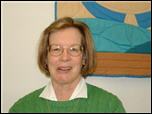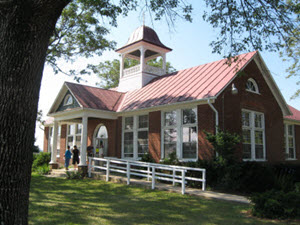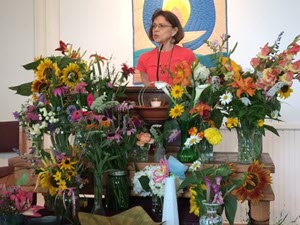
HUU Sermon Archives
Thanksgiving: An American Tribal Holiday
by Elizabeth Ihle
November 24, 2002
Sacred Scripture:
 I'm
going to read several scriptures this morning. They all have basically the same
message, but as an educator I know that sometimes people need to hear the same message
in different ways:
I'm
going to read several scriptures this morning. They all have basically the same
message, but as an educator I know that sometimes people need to hear the same message
in different ways:
The Hindu Visuddhimagga explicitly counsels: "greed is the real dirt, not dust….The wise have shaken off this dirt, and in the dirt free man's religion, live."
The Tao Te Ching, too, tells us that, "There is no greater calamity than indulging in greed," and later "Great trouble comes from not knowing what is enough. Great conflict arises from wanting too much. When we know when enough is enough, there will always be enough."
The holy book of the Sikhs, Adi Granth delivers the same news: "Where there is greed, what love can there be?"
First Timothy 6: 6-10 There is great gain in godliness with contentment; 7 for we brought nothing into the world, and we cannot take anything out of the world; 8 but if we have goods and clothing, with these we shall be content. 9But those who desire to be rich fall into temptation, into a snare, into many senseless and hurtful desires that plunge men into ruin and destruction. 10 For the love of money is the root of all evils; it is through this craving that some have wandered away from the faith and pierced their hearts with many pangs. (Revised Standard Version)
I'll return to these scriptures in a few minutes.
We have a galaxy of American holidays. The dimmest holiday stars like Presidents' Day, Columbus Day, and Veterans' Day, while certainly worthy, often just annoy the average citizen whose job continues but who can't do her banking or receive his mail. The middling holidays, Memorial Day and Labor Day, shine more brightly, marking the beginning and end of summer and at least giving the majority of us working folks a holiday attached to a week end. Then comes the Fourth of July. The downside is that the Fourth falls always on the fourth and therefore doesn't always provide a long weekend. The upside, though, is all the tradition it entails: picnics, patriotic music, ceremonies, and-best of all - fireworks. Still, the brightest star in the American holiday galaxy is Thanksgiving; it's filled with tradition and gives many of us four whole days off, provides a dandy excuse for a wonderful meal, and serves as the gateway to a holiday season that extends for five weeks. It's a terrific time, a time when many Americans will do, as the Thanksgiving card that I received a few days ago with a big, fat turkey on it advised, "Gobble till you wobble."
For many folks Thanksgiving ritual encompasses a number of days. For many, including us Unitarian Universalists, it starts weeks before with a food drive to provide for those less fortunate the means to a holiday meal. After today's service, the food that we have collected will be delivered to the Blue Ridge Area Food Bank. Some of us may decorate our homes with harvest colors as part of our celebration. Then today, the Sunday before Thanksgiving, we get to sing those wonderful, comforting Thanksgiving hymns. Those of us who grew up in other churches probably noticed that the UUs changed the words, but that's okay, and I'll return to the traditional words in a few minutes. Sometime in the next couple days, many of us have the privilege of spending some time with our families or the other folks that give us comfort and security. Next Thursday morning millions of Americans will watch the Macy's Thanksgiving Parade and about noontime see Santa approach the front of Macy's store. We'll then eat a Thanksgiving dinner often comprised of traditional foods like turkey, dressing, cranberry sauce, and pumpkin pie and visit with friends and family. For some folks, we need to throw in a football game or two into the tradition, and for others the holiday is not complete without visiting the after-Thanksgiving sales. All of these activities comprise the tribal rituals of the American Thanksgiving, and most of us look forward to them every year and find comfort and security in them.
Tribal rituals are a part of everyone's culture, though, of course, the exact nature of those rituals varies worldwide. Medical intuitive Carolyn Myss, author of a number of books including The Anatomy of the Spirit: The Seven Stages of Power and Healing, on whose work I am drawing this morning, links tribal culture with different facets of three religious cultures: Hinduism, Judaism, and Christianity. She says that the lowest of the Hindu chakras, one aspect of the Jewish Tree of Life of the Kabbalah, and the Christian sacrament of Baptism are all tribal rituals, and what all three of these do is to initiate human beings into their respective cultures. They connote group identity, group force, group willpower, and group belief systems. Let me explain a bit more and then link them to Thanksgiving.
The chakras of the Hindu tradition are the seven energy centers of the body well known in eastern medicine and religion. Each chakra relates to certain body parts and, according to Myss, certain illnesses. Each represents among other things a universal spiritual life_lesson that we must learn as we evolve into higher consciousness. ThFIX e one that we are discussing today is the lowest in the body, the First Chakra, located at our coccyx and representing lessons we must learn related to the material world. It points down and through it we draw energy from the earth that connects and grounds us. Not surprisingly, this is the chakra that provides the body's support –the skeletal system, the legs and feet, rectum, and the immune system. Myss relates the First Chakra to mental and emotional issues such as physical, family, and group safety and security, the ability to provide for life's necessities, the ability to stand up for oneself, feeling at home, and social and familial law and order. She relates it as well to such physical dysfunctions as sciatica, varicose veins, rectal tumors and cancers, depression, and immune related disorders. The important point for us to remember this morning about the First Chakra is the idea of safety, security, and support.
Many of us here know the seven Christian sacraments quite well. Myss says that the one related to the First Chakra is Baptism, the first sacrament in the Christian tradition. It's an initiation into the Christian tribe. Parents agree to rear their children in the Christian tribal tradition or an adult expresses her/his allegiance to the Christ. In return for that allegiance, the new Christian receives an expression of grace, an assurance that he/she is one of the Christian God's tribe, will be taken care of and loved by that Deity, and saved from a hellish afterlife. Again, please think safety, security, and support.
In the Jewish tribal tradition, the Tree of Life of the Kabbalah evolved over many centuries. Although the Tree of Life actually has ten components, three of the ten can be paired, and so again there are seven, just like in the chakras and the Christian sacraments. The lowest of these is the Shekinah, representing the feminine, the mystical community of Israel. Her other female names include Earth, Moon, Rose, Gaia, Garden of Eden. This is the grounded life-force, feeding all that is alive. Again, think safety, security, and support.
Let me share another expression of this very human need for safety, security, and support. If you have the privilege of experiencing an introductory psychology course, the name Abraham Maslow probably rings a bell. He constructed a pyramid of human needs with the idea that you couldn't climb to a higher level of human development until you satisfied the lower levels. And what was on the lowest levels? The first was physiological, the basics for survival: food, clothing, and shelter, and right above them was the need for security and security.
And, so as our holiday season approaches, we have especially in Thanksgiving an excellent opportunity to explore our tribal culture, our First Chakra, our American Baptism, our mystical community of Americans, or Maslow's foundations of human needs. We focus on these energy systems and needs when we listen to the national anthem, watch our kids in a Thanksgiving pageant, or more intensely still, when we support each other when we go through such national trauma as 9_11. Thanksgiving is our time for giving thanks for being Americans and for "circling our wagons" so to speak. Even our revised version of "Come, Ye Thankful People" speaks of gathering the harvest before the winter storms. This making sure we have enough before adversity strikes is definitely a First Chakra activity, and a legitimate one, ensuring our safety and security. "We Gather Together" again rewritten to salve UU conscience expresses the same sentiment: we're thankful for the bounty of the harvest and the Lord's support. As an aside, however, let me tell you that if you go to the traditional versions of both hymns, you'll see even more clearly their tribal nature: the assurance is that God's on our side and those outside our tribe are the wicked that need suppressing, that God is going to separate the wheat from the tares. Basically, the message is that that there are going to be winners and losers and we, our tribe, are among the former. Although I'm not in the camp of believing in no war at all, I share with many other UUs and other thoughtful Americans a concern with the mentality that God must be on our side. I prefer to think that a Divine Spirit is with all the world's creatures..
Thanksgiving launches the gift-buying season, and it's not an accident that Macy's, an American marketing icon almost since its founding in 1857, has sponsored now for over seventy-five years a holiday parade that ends at the door of the world-famous store and launches the holiday's official buying season. Then for many folks it's off to the stores on Friday for all the sales. It would be easy to blame marketers and the media for our greed, but that's too facile an answer. The powerful of all civilizations have amassed wealth at the expense of others, and we Americans now being among the wealthiest people on the globe are no exception. I think the need to amass wealth – stuff –is part of human nature and stocking up for hard times is truly prudent, but carrying it to excess, i.e. being greedy, doesn't make it right. We Americans need to take a hard look at balancing our genuine needs against our perceived wants.
Last summer, testifying before Congress, Federal Reserve Board chairman Alan Greenspan named "infectious greed" as the culprit in the rash of corporate scandals that surfaced this year. But someone like Greenspan spanking businessmen for exhibiting greed feels a bit like a betrayal. We have been told all along that greed-well harnessed and regulated-was good not only for corporations, but society as a whole, even the poor. As stockholders-more Americans own securities today than ever before-we profited from their greed, enabled them, and we certainly are not bad. After all, the stock boom of the 1990s enriched many of us here this morning, and because at least some of us were greedy-and I'll admit that I was in that group-we left our funds in the market because we knew we could earn even more. We chose not to know when enough is enough. But we're not bad people, but maybe greedy ones, and most of us even try to do some good in our community.
However, among other doers of good deeds in the past year are folks who have become household names — like ex-Enron CEO Ken Lay, supporter of many good causes including donations to higher education; Tyco CEO Dennis Kozlowski was a big supporter of the arts; MCI's Bernard Ebbers, proof-positive that a poor boy from Mississippi can make it big, made many donations including those to provide technology training for teachers. An even more recent example of a "do-gooder" is Citigroup which recently made a million dollar donation over five years to the 92nd street Y in New York City, but only after loving father and Citigroup securities analyst Jack Grubman changed his investment advice about AT&T, thus winning investment banking fees for Citigroup and enough influence to insure the admission of his twin daughters into the exclusive 92nd Street Y nursery school.
Not bad, just greedy, huh? The SEC, the Securities and Exchange Commission, reported the other week that the wave of spectacular corporate scandals over the past year has cost the average U.S. household $60,000 as some $5 trillion in market values was lost. The highest levels of corporate executives at Enron, Tyco, and WorldCom with collusion from auditors like Arthur Anderson crossed the line from storing up for proverbial hard times to just being plain greedy.
Maybe we think of greed as more of a "failing" than as a sin because it's all around us, and most of us are, if we think about it, greedy, at least in some senses. Greed permeates American culture, and Thanksgiving gives us a chance to celebrate it. What is so easily forgotten in the stories of the first Thanksgiving with the Pilgrims and the Indians is that our country was not settled primarily to have religious freedom, but to improve lives and to make money. As good Virginians, we already know that the 1607 Jamestown settlement was an economic venture, but how many Americans are aware that only 50 of the 101 folks on the Mayflower were Pilgrims? The others were just ordinary settlers, indentured servants, and hired hands, moving to a new place to improve their lives. Thanksgiving is about safety and security. "All is safely gathered in" and getting more is just the American way of life. We are highly materialistic, and the Nature Conservancy tells us that we Americans, though just 5% of the world's population, use 25% of the world's natural resources.
Greed enters too in our love of buying. "Twenty-five percent off," no interest payments until February, a discount to the first 100 customers, or coupons that promise us a price break if we'll only buy the larger size of something are come-ons that tempt us daily. And it's not just the big items. I got suckered into the "buy 1 get 1 free" mentality at Kroger's the other week, and I'm now the proud owner of ten pounds of onions, and it's not easy for a single person to use that many. And what about Costco? Buying in bulk may satisfy a security need, but sometimes I find myself wondering later why I ever bought so much of some stuff. Because of our greed, we sometimes buy when we don't have need. The problem we face is when does using our money wisely slide down the ever-so-slippery slope to greed.
Our scriptures this morning had harsh words to say about greed. "Greed is the real dirt, not dust," say the Hindus. It is, along with Pride that Jim Geary mentioned the other week, among the Seven Deadly Sins, a list compiled in the 500s AD, and some folks will tell you that Greed itself is the mother lode of all sins. "For the love of money is the root of all evils," trumpets the Bible. It's often greed that causes us to covet other people's possessions, lie, steal, and even murder.
I'm afraid that for many of us buying and having have themselves become acts of feeling secure, apart from the necessities that we actually need for food, clothing, and shelter. Amassing goods is deeply embedded in the American psyche, and I think it needs reexamination. We need to return to the wisdom of the Tao Te Ching and know when enough is enough. On this Thanksgiving, the brightest star in our galaxy of national holidays, let us turn away from greed and the "Gobble till you wobble" philosophy and towards being thankful for the bounty of our lives-the full harvest and the gorgeous autumn season, the safety and security provided by our families, friends, and spiritual community, and the privilege of living in one of the most stable countries on the globe. Finally, let us set a goal of having enough but not too much. So may it be. Happy Thanksgiving!!!
Read more sermons or talks by Elizabeth Ihle.
- Little Cabin in the Woods
- Come to My Garden: 2002 Flower Communion
- Fire: The Light Within and Without
- Hildegard of Bingen: A Medieval Mystic for the Modern Age
- Katrina Sermon
- Thank Heavens for Mother Earth!
- Thanksgiving: An American Tribal Holiday
- Washin' in the Water, Goin' with the Flow
- Sacred Spaces
For the latest sermons and events at HUU, visit our Community Cafe.
Inclement
Weather Policy
Worship
Service Materials


UUs on YouTube
Our denomination has an official presence on YouTube! The Unitarian Universalist Association's YouTube site includes several videos and lots of interesting commentary.
Harrisonburg Unitarian Universalists 4101 Rawley Pike | Harrisonburg,
VA 22801
Mailing Address: | PO Box 96 | Harrisonburg, VA 22803
| (540) 867-0073 | Webmaster
HUU is a member of the Southern
Region of the Unitarian Universalist
Association
Privacy Policy &
Disclaimer
Site Design & Maintainence : Expression
Web Tutorials & Templates


